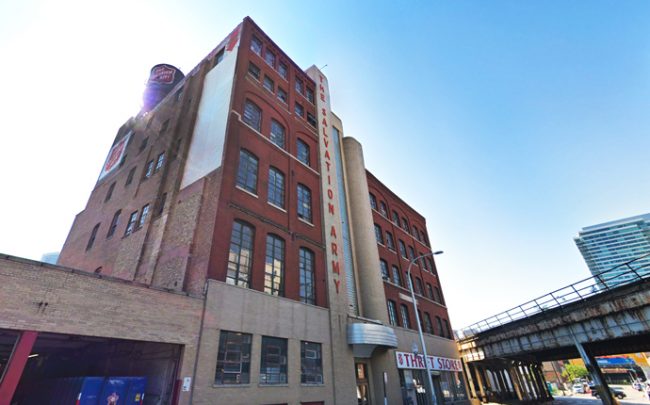Every day, The Real Deal rounds up Chicago’s biggest real estate news. We update this page at 10 a.m. and 4 p.m. PT. Please send any tips or deals to tips@therealdeal.com
This page was last updated at 5:00 p.m. CST
Major Arlington Heights redevelopment project gets big loan. Washington Capital Management provided a $137M construction loan to Springbank for the second phase of its Arlington Downs project. Plans for the project include a 116-key hotel, a 263-unit apartment building and 40,000 square feet of commercial space. [CCR]
Sterling Bay not interested in buying shuttered grocer near Lincoln Yards. The prolific local developer is passing on the opportunity to buy the 61,000-square-foot former Stanley’s Fresh Fruit and Vegetable Market that sits next to its Lincoln Yards mega-development. The broker marketing the store, Ed Wabick of Paine Wetzel Commercial Real Estate, said Sterling Bay appears more focused on constructing Lincoln Yards. [Block Club]
Massive new South Loop apartment tower wins prestigious designation. Oxford Capital Group’s Essex on the Park, a 479-unit building at 808 South Michigan Avenue, is the first Illinois building to be WELL-certified. WELL looks at resident’s wellness, ranking building by factors including air quality, water quality, light, fitness, comfort and even nourishment. [Crain’s]
Northpoint Development begins work on huge industrial park. The Missouri-based industrial developer has broken ground on its Avenue O industrial park, a 2.3 million-square-foot warehouse development on the city’s Far South Side. Contractor Meridian Design Build began work on the first speculative building, a 359,000-square-foot warehouse facility. [REbusinessonline]

Former Chicago alderman Joe Moore
Ex-alderman begins new career in real estate. Former Ald. Joe Moore (49th) used to helm the city’s Committee on Housing and Real Estate. But after being ousted in this year’s elections, Moore has now signed on to lead the municipal division of Palos Heights-based Dilberto Real Estate Services. [TRD]
Nicholas Cage regrets “real estate buying spree” and $276K dinosaur skull. The actor, who at once owned multiple properties in the U.S., the Caribbean and two castles in Europe, has opened up to The New York Times about his real-estate buying spree, ill-fated dinosaur skull purchase, and his quest for the grail in Rhode Island. It’s quite a read. [NYT]
Harvey Weinstein sold millions worth of real estate between October 2017 and April 2018. Two properties he sold were in Manhattan, according to an analysis by the Wall Street Journal. The now disgraced Hollywood producer sold a West Village townhouse for $25.6 million, $10.65 million more than he bought it for in 2006; and a commercial condo in Tribeca for $6.1 million, $5 million more than he paid in 1989. The purge of properties began about six months before sexual-misconduct allegations came out against him. [WSJ]

The Salvation Army’s River West complex. (Credit: Google Maps)
Salvation Army has listed its River West campus next to a megadevelopment site. The nonprofit is seeking buyers for its 74,000-square-foot River West campus that is next to the Tribune printing press site, slated to be redeveloped in a massive project. Salvation Army officials have not made public an asking price, but sources told Crain’s the property could fetch as much as $40 million. [Crain’s]
Fulton Market’s new $20 million streetscape project is crumbling. A year after unveiling new streetscapes, revamped parking, improved crosswalks and better lighting in Fulton Market, the new upgrades are already deteriorating. The project was paid for with $20 million in tax increment financing in the booming neighborhood. [Block Club]
Colliers International Chicago absorbs local boutique brokerage. The commercial real estate brokerage will merge with Des Plaines-based Podolsky Circle, with the combined companies retaining the Colliers name. Colliers will pull in Podolsky’s nine agents and seven contractors, and will take over the firm’s property management portfolio. [TRD]
Convexity’s hotel plan seeking city approval. The prolific hotel developer will seek the city’s approval to rezone a parking structure for its 13-story hotel project at 180 West Randolph Street. The hotel would include 307 rooms and will go in front of the Zoning Committee in early September. [TRD]
South Florida and LA real estate investor pleads guilty to Ponzi scheme. Robert Shapiro, former head of California-based Woodbridge Group of Companies pleaded guilty to bilking investors out of as much as $95 million as part of the $1.3 billion Ponzi scheme. Shapiro is accused of seeking investors for his real estate companies, only to spend their money on private homes, jets, travel and works of art from the likes of Picasso. [Miami Herald]
Housing sentiment reached a record high in July. A monthly index from Fannie Mae has found that consumer confidence in housing hit a record high in July, partly due to falling mortgage rates and strong employment. Meanwhile, according to a Redfin report, bidding wars fell to their lowest rate since 2011. Miami was the least competitive market last month, with New York also seeing lower than average activity. [CNBC]
Inflated bond ratings are back. Artificial bond ratings, one of the causes of the financial crisis, still persist a decade on, according to an analysis by the Wall Street Journal. It also found that the main ratings firms have altered some criteria for determining the riskiness of bonds, leading to temporary jumps in market share.[WSJ]
Climate change is worsening the affordable housing crisis. A new report from the Center for American Progress has found that the national housing crisis disproportionately affects minority communities and the disabled, who also have limited access to resources to recover from natural disasters linked to climate change. [Scientific American]
